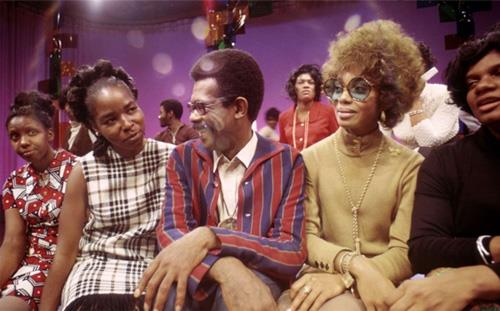
The forgotten archives of television aren't all from the earliest days, as we are reminded, in a new PBS documentary called Mr. Soul!
Mr. Soul!, which airs at 10 p.m. ET Monday in the PBS Independent Lens series (check local listings), focuses on Ellis Haizlip, host of the Soul! series that aired on PBS between 1968 and 1973.
Haizlip, who died in 1991, isn't a household name in Black culture. Mr. Soul! argues that he should be.
The show, developed because there was virtually no Black culture presence anywhere on television, featured performances by soul music artists like Stevie Wonder, Patti LaBelle, Al Green, and Billy Preston. That was only one part of the mission because when it came to Black culture, Haizlip was a big-picture guy.
And not even particularly a music fanatic.
While he knew music, his background and personal passion lay more in dance. In contrast to the likes of Shindig in the '60s and later shows like Soul Train, Soul! regularly featured classical dance and ballet, rather than go-go and club dancers.
Haizlip also interspersed performance segments with discussions and interviews, talking to high-profile newsmakers from Muhammad Ali to Stokely Carmichael about sociology, strategy, politics, and the developments of the day.
When Nation of Islam Minister Louis Farrakhan guested, Haizlip asked him about the Nation's rejection of homosexuality, an interesting question because Haizlip himself was openly gay back when that was a bold acknowledgment.
Farrakhan replies that the Nation did not reject individuals for their "deviance" but tried to "help" them reject it themselves.
As this suggests, Haizlip did not shy from controversial subjects. His performance guests included the Last Poets, who became one of a number of artists whose performance employed the n-word.
Haizlip dismissed any notion he sought radical views, saying he was only giving a television platform, finally, to the culture that was already out there and thriving but had been invisible in this medium.
Numerous artists and historians in this documentary, which was produced by Ellis Haizlip's niece Melissa Haizlip, talk about how Soul! became appointment television for the Black community. While there had been performances on television and occasional scripted shows that provided a small Black presence on TV before, Soul! was widely seen as the first one that seemed to understand the breadth and depth of Black culture, linking its many elements and exploring how the culture reflected both politics and daily lives.
Ellis Haizlip comes across as a visionary, someone who saw the opportunity this kind of show could afford and laid out its scope. Early in the show's development, it was suggested that it could become a Black Tonight show, and Haizlip rejected that notion, having no interest in becoming a Johnny Carson figure.
The brief clips from the show suggest the on-air Haizlip was more of a facilitator, introducing the acts or asking the questions and then stepping out of the spotlight.
That may explain why he never became a star except to those who realized that without him, Soul! likely would have been a very different show.
The ending of Mr. Soul! leaves open the question of why the show was cancelled – or, in the PBS world, defunded.
As heard on Oval Office tapes, President Richard Nixon was pushing strongly to eliminate funding for public broadcasting shows with political content, especially the kind that criticized Nixon. That isn't necessarily a smoking gun, but it illustrates how the content that pleased Haizlip's audience didn't please everyone.
After the demise of Soul!, television continued, for the most part, to ignore Black culture and issues. That's the bad news. The good news is that Soul! is credited with increasing awareness of and respect for Black culture, progress that didn't spell victory but did push America forward.
Even if it has drifted into the mists of TV history.